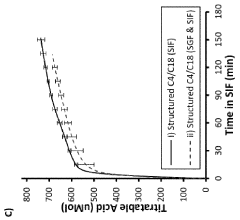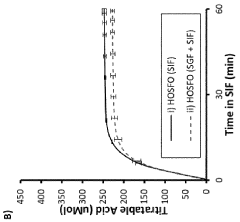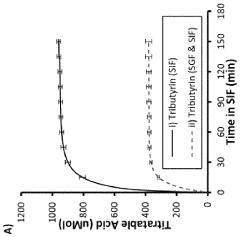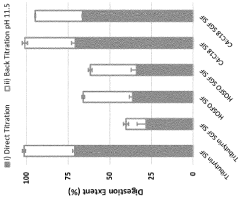Benefits of Butyrate in Enhancing Athletic Performance
Butyrate in Sports: Background and Objectives
Butyrate, a short-chain fatty acid produced by gut bacteria during the fermentation of dietary fiber, has recently gained attention in the sports and athletic performance arena. The exploration of butyrate's potential benefits for athletes stems from a growing understanding of the gut-brain axis and its influence on various physiological processes. This research aims to elucidate the mechanisms by which butyrate may enhance athletic performance and to establish clear objectives for further investigation.
The historical context of butyrate in sports science is relatively recent, with most significant research emerging in the past decade. Initially, butyrate was primarily studied for its role in gut health and its potential anti-inflammatory properties. However, as the scientific community began to uncover the far-reaching effects of gut microbiota on overall health and performance, interest in butyrate's impact on athletic performance has surged.
The evolution of this field has been marked by several key developments. Early studies focused on butyrate's effects on energy metabolism and its potential to improve endurance. Subsequent research expanded to examine its impact on muscle recovery, oxidative stress reduction, and even cognitive function during intense physical activity. This progression reflects a shift from viewing butyrate solely as a gut health promoter to recognizing it as a potential ergogenic aid.
Current technological advancements in metabolomics and microbiome analysis have further propelled this field, allowing for more precise measurements of butyrate levels and their correlations with various performance metrics. These tools have enabled researchers to delve deeper into the molecular mechanisms underlying butyrate's effects on athletic performance.
The primary objectives of this technical research are multifaceted. Firstly, it aims to comprehensively review existing literature on butyrate's role in athletic performance, synthesizing findings from both animal and human studies. Secondly, it seeks to identify the specific physiological pathways through which butyrate may enhance performance, including its effects on energy metabolism, muscle function, and recovery processes.
Furthermore, this research intends to explore the optimal methods for increasing butyrate levels in athletes, whether through dietary interventions, supplementation, or manipulation of the gut microbiome. It also aims to establish standardized protocols for measuring butyrate levels and assessing its impact on various aspects of athletic performance.
Another crucial objective is to investigate potential synergies between butyrate and other ergogenic aids or training modalities. This includes examining how butyrate supplementation might interact with different dietary regimens, exercise protocols, or other performance-enhancing substances.
Lastly, this research seeks to outline future directions for study, including the need for large-scale, long-term clinical trials to definitively establish the efficacy and safety of butyrate supplementation in athletes. It also aims to identify potential applications beyond traditional sports, such as in rehabilitation settings or for improving physical performance in aging populations.
Market Analysis: Butyrate in Sports Nutrition
The sports nutrition market has witnessed significant growth in recent years, driven by increasing health consciousness and a growing emphasis on athletic performance. Within this expanding sector, butyrate has emerged as a promising ingredient with potential benefits for enhancing athletic performance. The global sports nutrition market was valued at approximately $44 billion in 2021 and is projected to reach $85 billion by 2027, growing at a CAGR of 11.5% during the forecast period.
Butyrate, a short-chain fatty acid, has gained attention in the sports nutrition industry due to its potential to improve gut health, reduce inflammation, and enhance energy metabolism. These properties align well with the demands of athletes and fitness enthusiasts seeking to optimize their performance and recovery. The market for butyrate-based sports nutrition products is still in its nascent stage but shows promising growth potential.
Currently, butyrate supplements represent a small but growing segment within the sports nutrition market. While exact market size figures for butyrate-specific products are not readily available, industry experts estimate that the market for gut health-focused sports nutrition products, which includes butyrate, is growing at a rate of 15-20% annually. This growth is driven by increasing awareness of the gut-brain axis and its impact on overall athletic performance.
The target demographic for butyrate-based sports nutrition products primarily includes professional athletes, endurance sports participants, and serious fitness enthusiasts. These consumers are typically more informed about cutting-edge nutritional strategies and are willing to invest in products that offer a competitive edge. The market is also expanding to include recreational athletes and health-conscious individuals looking to improve their overall well-being through gut health optimization.
Key players in the sports nutrition industry have started to take notice of butyrate's potential. Several established brands have begun incorporating butyrate or its precursors into their product lines, while new startups focused specifically on butyrate-based supplements have also emerged. This trend indicates a growing recognition of butyrate's value in the sports nutrition market.
Geographically, North America and Europe currently lead the market for butyrate-based sports nutrition products, accounting for an estimated 60-65% of the global market share. However, the Asia-Pacific region is expected to witness the fastest growth in the coming years, driven by increasing disposable incomes, growing health awareness, and a rising number of fitness enthusiasts in countries like China and India.
As research continues to uncover the benefits of butyrate for athletic performance, the market is expected to expand further. Challenges such as taste issues and stability of butyrate in various product formulations are being addressed through innovative delivery systems and flavor masking technologies. These advancements are likely to contribute to the wider adoption of butyrate in sports nutrition products in the near future.
Current State of Butyrate Research in Athletics
Butyrate research in athletics has gained significant traction in recent years, with a growing body of evidence suggesting its potential benefits for athletic performance. The current state of research focuses on several key areas, including energy metabolism, muscle function, and recovery.
One of the primary areas of investigation is butyrate's role in energy metabolism. Studies have shown that butyrate can enhance mitochondrial function, potentially leading to improved energy production in athletes. This is particularly relevant for endurance sports, where efficient energy utilization is crucial. Researchers have observed increased ATP production and improved oxidative capacity in muscle cells treated with butyrate, suggesting a potential ergogenic effect.
Muscle function and adaptation are also central to current butyrate research in athletics. Several studies have demonstrated that butyrate supplementation may enhance muscle protein synthesis and reduce muscle protein breakdown. This could translate to improved muscle recovery and growth, which is essential for athletes in strength and power sports. Additionally, some research indicates that butyrate may help maintain muscle mass during periods of inactivity or injury, which could be valuable for athletes during rehabilitation.
The anti-inflammatory properties of butyrate have drawn attention in the context of athletic recovery. Intense exercise often leads to inflammation, which can impair performance and prolong recovery times. Preliminary studies suggest that butyrate may help modulate the inflammatory response, potentially accelerating recovery between training sessions or competitions.
Gut health is another area where butyrate shows promise for athletes. The gut microbiome plays a crucial role in nutrient absorption, immune function, and even mental health – all factors that can impact athletic performance. Butyrate, as a key metabolite produced by gut bacteria, may help maintain a healthy gut environment, potentially improving nutrient uptake and overall well-being in athletes.
Recent research has also explored butyrate's potential impact on exercise-induced adaptations. Some studies suggest that butyrate may enhance the body's response to training stimuli, potentially leading to greater improvements in performance over time. This includes increased mitochondrial biogenesis and enhanced fat oxidation capacity, which could be particularly beneficial for endurance athletes.
While the current state of butyrate research in athletics is promising, it's important to note that many studies are still in their early stages. Most research has been conducted in vitro or in animal models, with human trials being relatively limited. This highlights the need for more comprehensive, long-term studies in human athletes to fully understand the effects and optimal application of butyrate in sports performance.
Existing Butyrate Delivery Methods for Athletes
01 Butyrate supplementation for athletic performance enhancement
Butyrate, a short-chain fatty acid, may be used as a supplement to improve athletic performance. It is believed to enhance energy metabolism, reduce inflammation, and improve gut health, which can contribute to better overall performance in athletes.- Butyrate supplementation for athletic performance: Butyrate, a short-chain fatty acid, may be used as a supplement to enhance athletic performance. It is believed to improve energy metabolism, reduce inflammation, and support gut health, which can contribute to better overall performance and recovery in athletes.
- Wearable devices for monitoring athletic performance: Advanced wearable devices are being developed to monitor various aspects of athletic performance. These devices can track metrics such as heart rate, movement patterns, and physiological parameters, providing real-time data to athletes and coaches for performance optimization.
- Training systems for improving athletic performance: Innovative training systems are being designed to enhance athletic performance. These systems may incorporate virtual reality, biofeedback, and personalized training programs to help athletes improve their skills, reaction times, and overall performance in their respective sports.
- Nutritional strategies for athletic performance enhancement: Specialized nutritional strategies are being developed to optimize athletic performance. These may include tailored dietary plans, timing of nutrient intake, and specific combinations of macronutrients and micronutrients to support energy production, muscle recovery, and overall athletic performance.
- Performance analysis and prediction tools: Advanced analytics and prediction tools are being created to assess and forecast athletic performance. These tools may use machine learning algorithms, historical data, and real-time metrics to provide insights into an athlete's current performance and potential for improvement.
02 Wearable devices for monitoring athletic performance
Advanced wearable devices can be used to track and analyze various aspects of athletic performance, including metrics related to butyrate metabolism. These devices may provide real-time feedback and data analysis to help athletes optimize their training and performance.Expand Specific Solutions03 Nutritional formulations containing butyrate for athletes
Specialized nutritional formulations incorporating butyrate or its precursors may be developed to support athletic performance. These formulations could be designed to enhance energy production, reduce muscle fatigue, and improve recovery in athletes.Expand Specific Solutions04 Training methods incorporating butyrate for performance enhancement
Novel training methods may be developed that integrate butyrate supplementation or strategies to increase endogenous butyrate production. These methods could focus on optimizing the timing and dosage of butyrate intake in relation to exercise routines to maximize athletic performance.Expand Specific Solutions05 Genetic testing for butyrate metabolism in athletes
Genetic testing methods may be employed to assess an athlete's ability to metabolize butyrate effectively. This information could be used to tailor personalized nutrition and training plans to optimize athletic performance based on individual genetic profiles.Expand Specific Solutions
Key Players in Butyrate-Based Sports Supplements
The market for butyrate in enhancing athletic performance is in its early growth stage, with increasing research interest and potential applications. The market size is expanding as more athletes and sports nutrition companies recognize butyrate's benefits. Technologically, the field is evolving rapidly, with companies like Société des Produits Nestlé SA, DSM IP Assets BV, and Ajinomoto Co., Inc. leading in product development and research. Academic institutions such as The University of Chicago and Zhejiang University are contributing to the scientific understanding of butyrate's effects. While the technology is not fully mature, it shows promising advancements in formulation, delivery methods, and efficacy studies, indicating a competitive landscape with both established players and innovative startups entering the market.
Ajinomoto Co., Inc.
Vdf Futureceuticals, Inc.
Core Studies on Butyrate's Athletic Benefits
- Development of butyrate moiety containing triglycerides with improved organoleptic properties, specifically formulated compounds like 1,3-dibutyryl-2-oleoylglycerol, which are used in nutritional compositions and supplements to enhance muscle regeneration and function, reducing muscle wasting.
- Development of triglycerides with improved organoleptic properties, specifically 1,3-dibutyryl-2-palmitoylglycerol and other combinations of butyrate and long-chain fatty acids, which are dairy-free, cholesterol-free, and vegan, designed to increase blood ketone levels and treat related diseases without adding mineral salts.
Safety and Regulatory Aspects of Butyrate Use
The safety and regulatory aspects of butyrate use in athletic performance enhancement are critical considerations for athletes, coaches, and sports organizations. Butyrate, a short-chain fatty acid, has shown promising results in improving athletic performance, but its use must be carefully evaluated within the context of existing regulations and safety standards.
From a safety perspective, butyrate is generally considered safe when consumed in moderate amounts through dietary sources or as a supplement. However, high doses or prolonged use may lead to gastrointestinal discomfort, including bloating, cramping, and diarrhea. Athletes should be aware of these potential side effects and consult with healthcare professionals before incorporating butyrate supplements into their regimen.
Regulatory bodies, such as the World Anti-Doping Agency (WADA) and national sports organizations, have not explicitly banned butyrate or its derivatives for use in athletic competition. However, the status of butyrate remains in a gray area, as it is not explicitly approved either. Athletes should exercise caution and stay informed about any changes in regulations that may affect the use of butyrate in competitive sports.
The production and quality control of butyrate supplements are subject to regulations governing dietary supplements. In the United States, the Food and Drug Administration (FDA) oversees the safety and labeling of dietary supplements, including those containing butyrate. Manufacturers are required to ensure the safety of their products and comply with good manufacturing practices (GMPs) to maintain quality and consistency.
It is important to note that the regulatory landscape for butyrate may vary across different countries and sports organizations. Athletes competing internationally should be particularly vigilant about the regulations in the countries where they train and compete, as well as the specific rules of their sport's governing bodies.
Research on the long-term effects of butyrate supplementation in athletes is still limited. As such, sports organizations and regulatory bodies may require more comprehensive studies to establish clear guidelines for its use. Athletes and sports professionals should stay informed about ongoing research and any emerging safety concerns related to butyrate supplementation.
In conclusion, while butyrate shows promise in enhancing athletic performance, its use must be approached with caution. Athletes should prioritize safety, adhere to existing regulations, and consult with medical professionals and sports authorities to ensure compliance with anti-doping policies. As research progresses, it is likely that more specific guidelines and regulations regarding butyrate use in sports will be developed, providing clearer direction for athletes and sports organizations.
Ethical Considerations in Performance Enhancement
The use of butyrate as a performance-enhancing supplement in athletics raises several ethical considerations that must be carefully examined. One primary concern is the potential for unfair advantage. If butyrate supplementation significantly improves athletic performance, it could create an uneven playing field between athletes who have access to this supplement and those who do not. This disparity may be particularly pronounced in competitions where financial resources play a significant role in an athlete's ability to access cutting-edge supplements.
Another ethical issue to consider is the long-term health implications of butyrate supplementation. While current research suggests potential benefits, the long-term effects of sustained, high-dose butyrate intake on human health are not yet fully understood. Athletes may be exposing themselves to unknown risks in pursuit of enhanced performance, which raises questions about informed consent and the responsibility of sports organizations to protect their athletes' well-being.
The concept of authenticity in athletic achievement is also challenged by the use of butyrate supplements. There is an ongoing debate about where to draw the line between acceptable performance enhancement through nutrition and training, and artificial augmentation of abilities. This discussion touches on the core values of sports, such as natural talent, hard work, and fair competition.
Regulatory bodies in sports face the challenge of determining whether butyrate supplementation should be classified as a performance-enhancing substance and, if so, how it should be regulated. This decision has far-reaching implications for drug testing protocols, competition rules, and the overall integrity of athletic competitions.
There are also broader societal implications to consider. The use of performance-enhancing supplements in elite sports can influence public perception and potentially encourage similar practices among amateur athletes and even non-athletes seeking to improve their physical capabilities. This raises concerns about the normalization of supplement use and its potential impact on public health.
Lastly, the development and promotion of butyrate as a performance enhancer raise questions about the allocation of research resources. There may be ethical considerations regarding whether the pursuit of athletic enhancement is a justifiable use of scientific effort and funding, particularly when compared to research aimed at addressing more pressing health concerns or societal issues.







